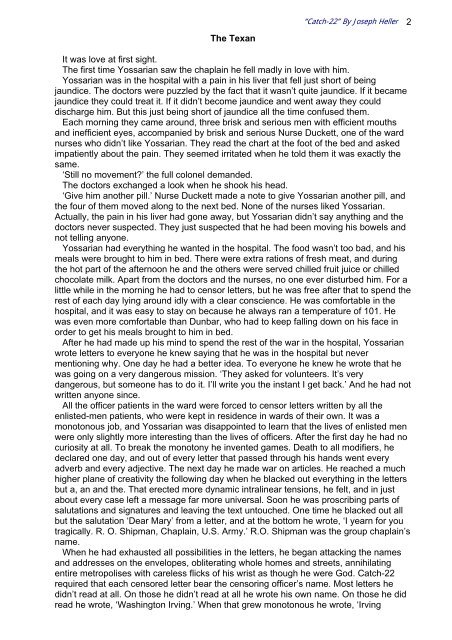You also want an ePaper? Increase the reach of your titles
YUMPU automatically turns print PDFs into web optimized ePapers that Google loves.
“Catch-22” <strong>By</strong> <strong>Joseph</strong> Heller 2<br />
The Texan<br />
It was love at first sight.<br />
The first time Yossarian saw the chaplain he fell madly in love with him.<br />
Yossarian was in the hospital with a pain in his liver that fell just short of being<br />
jaundice. The doctors were puzzled by the fact that it wasn’t quite jaundice. If it became<br />
jaundice they could treat it. If it didn’t become jaundice and went away they could<br />
discharge him. But this just being short of jaundice all the time confused them.<br />
Each morning they came around, three brisk and serious men with efficient mouths<br />
and inefficient eyes, accompanied by brisk and serious Nurse Duckett, one of the ward<br />
nurses who didn’t like Yossarian. They read the chart at the foot of the bed and asked<br />
impatiently about the pain. They seemed irritated when he told them it was exactly the<br />
same.<br />
‘Still no movement?’ the full colonel demanded.<br />
The doctors exchanged a look when he shook his head.<br />
‘Give him another pill.’ Nurse Duckett made a note to give Yossarian another pill, and<br />
the four of them moved along to the next bed. None of the nurses liked Yossarian.<br />
Actually, the pain in his liver had gone away, but Yossarian didn’t say anything and the<br />
doctors never suspected. They just suspected that he had been moving his bowels and<br />
not telling anyone.<br />
Yossarian had everything he wanted in the hospital. The food wasn’t too bad, and his<br />
meals were brought to him in bed. There were extra rations of fresh meat, and during<br />
the hot part of the afternoon he and the others were served chilled fruit juice or chilled<br />
chocolate milk. Apart from the doctors and the nurses, no one ever disturbed him. For a<br />
little while in the morning he had to censor letters, but he was free after that to spend the<br />
rest of each day lying around idly with a clear conscience. He was comfortable in the<br />
hospital, and it was easy to stay on because he always ran a temperature of 101. He<br />
was even more comfortable than Dunbar, who had to keep falling down on his face in<br />
order to get his meals brought to him in bed.<br />
After he had made up his mind to spend the rest of the war in the hospital, Yossarian<br />
wrote letters to everyone he knew saying that he was in the hospital but never<br />
mentioning why. One day he had a better idea. To everyone he knew he wrote that he<br />
was going on a very dangerous mission. ‘They asked for volunteers. It’s very<br />
dangerous, but someone has to do it. I’ll write you the instant I get back.’ And he had not<br />
written anyone since.<br />
All the officer patients in the ward were forced to censor letters written by all the<br />
enlisted-men patients, who were kept in residence in wards of their own. It was a<br />
monotonous job, and Yossarian was disappointed to learn that the lives of enlisted men<br />
were only slightly more interesting than the lives of officers. After the first day he had no<br />
curiosity at all. To break the monotony he invented games. Death to all modifiers, he<br />
declared one day, and out of every letter that passed through his hands went every<br />
adverb and every adjective. The next day he made war on articles. He reached a much<br />
higher plane of creativity the following day when he blacked out everything in the letters<br />
but a, an and the. That erected more dynamic intralinear tensions, he felt, and in just<br />
about every case left a message far more universal. Soon he was proscribing parts of<br />
salutations and signatures and leaving the text untouched. One time he blacked out all<br />
but the salutation ‘Dear Mary’ from a letter, and at the bottom he wrote, ‘I yearn for you<br />
tragically. R. O. Shipman, Chaplain, U.S. Army.’ R.O. Shipman was the group chaplain’s<br />
name.<br />
When he had exhausted all possibilities in the letters, he began attacking the names<br />
and addresses on the envelopes, obliterating whole homes and streets, annihilating<br />
entire metropolises with careless flicks of his wrist as though he were God. Catch-22<br />
required that each censored letter bear the censoring officer’s name. Most letters he<br />
didn’t read at all. On those he didn’t read at all he wrote his own name. On those he did<br />
read he wrote, ‘Washington Irving.’ When that grew monotonous he wrote, ‘Irving
















